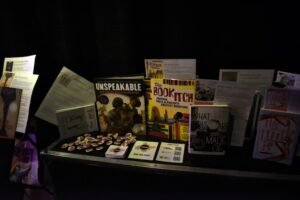Publishers Speak Out Against Book Bans

A display of Lerner books that have been banned. Photo by Giliane Mansfeldt/Independent Picture Service. Used with permission.
In spring 2024 I joined the group Authors Against Book Bans, formed to fight against censorship in schools, public libraries, and even books for sale in bookstores. The group has now grown into thousands of authors living in every state in the U.S., with a few exceptions (not sure about Alaska). In the wake of the November election, Authors Against Book Bans wrote an open letter to publishers and asked that their members send the letters to their editors and talk about the issue with them. The letter reads as follows:
With the election of the Trump administration and its policies as embodied in Project 2025, we authors have deep concerns about how our publishers will be operating and how publishers will advocate for and protect authors. Trump’s agenda explicitly calls for the criminalization of authors, teachers, librarians, and publishing professionals with consequences including, “imprison[ment],” and being “classed as registered sex offenders” (Pg 4, Project 2025). For authors who are not citizens, this could also result in deportation. This promises to be a pro-censorship, pro-book-banning administration, and the successful implementation of its policies will require willing compliance of America’s institutions, including its corporations.
The freedom to write is as important as the freedom to read. We have been heartened by many publishers’ willingness to engage in legal and legislative pathways to fight book banning, and want to be sure that you will double-down on your fight during this consequential time.
This past week, AABB held open forums with authors from all genres and age levels to better understand author concerns and needs. While this may not be a complete list due to the rapid turnaround, we know we have a short time before January to prepare for what is to come, and we want to start this conversation sooner rather than later.
As authors, we need you to:
- Continue to acquire and promote books by LGBTQIA+ and BIPOC voices. We are concerned that these voices under particular attack will be silenced or discouraged, directly and/or indirectly.
- Be unequivocal in your support of LGBTQIA+ and BIPOC authors. We need to know that no author will be asked to “tone down” or erase elements in their books to please potential censors or to avoid being targeted by unjust laws in certain states. Authors need to know that we can continue to speak our truths in our works and remarks.
- Guarantee the safety and confidentiality of all personal information that exists in your portals, or that has been shared for book promotion. We need publishers to refuse to provide lists of:
- Authors or staff they know to be immigrants, Muslims, individuals with backgrounds from Iraq, Iran, Libya, Somalia, Sudan, Syria, Yemen, Gaza et al (targeted under Trump’s promise to expand the “Muslim ban”)
- All books by queer or trans authors, or that include queer or trans characters or content
- Authors and their citizenship, birthplace, and/or other personal information
- Books that reference diversity, equity, inclusion, sexual orientation, gender identity, racism, privilege, or “critical race theory” etc as defined or listed on page 4 of Project 2025
- Refuse to provide “ratings” of books that goes beyond the current industry standard categorization of books by age group.
- Resist requests for authors to sign contractual language for appearances that impinges upon our free speech in ways including but not limited to: written or spoken language, personal expenditures, personal advocacy.
- Provide security in states or locations where an author may be under threat or has received threats. If an author is arrested for discussing their book in a public space, we need you to promise to provide legal aid. We need clear industry standards regarding author security and direct contact information for security and legal needs.
- Stand against the blanket weaponization of “pornography,” “obscenity,” “triggering,” and “inappropriate” as they have been used in widespread book bans to target anything with queer content, sex, or references to racism, bigotry, misogyny, abortion, etc. Project 2025 states that people who produce or distribute anything deemed “pornographic” should be jailed, though it does not define pornographic, nor does it seem to adhere to the SCOTUS standard of pornography.
- Ensure the freedom of every author to use the terms targeted on pages 4-5 of Project 2025 (which include but are not limited to: sexual orientation and gender identity, diversity, equity, and inclusion, gender, gender equality, gender equity, gender awareness, gender-sensitive, abortion, reproductive health, reproductive rights, etc) freely in their works. We need to know you will continue to send LGBTQIA+ and BIPOC authors to schools, libraries, and festivals funded in whole or in part by federal grants.
- Provide training on author safety and emergency contacts for situations when an author feels unsafe.
- Be more aggressive and more public in fighting book bans and censorship at local, state, and the national level.
We approach all these needs with the assumption of your support, and we will be vigilant to make sure that any divergence on these crucial points will be noted and protested. It’s imperative that publishers, like authors, do not obey in advance. We must be aligned against policies that promote censorship, book bans, and the criminalization of storytelling. We look forward to working together with you and with all the other organizations fighting for our fundamental freedoms to read and to write.
Sincerely,
Authors Against Book Bans

Performers at the Bands for the Banned concert in Minneapolis, December 2024. Photo by Mae Saunders. Used with permission.
At various meetings of Authors Against Book Bans, we talked about the importance of legal challenges to book bans that have been funded in part by deep-pocketed Big 5 publishers, with the nation’s largest publisher, Penguin Random House, taking the lead. We also acknowledged that smaller and specialized publishers don’t have the resources to contribute to these challenges, even though they are also affected by book bans. We’ve encouraged those publishers to do what they can, in their communities, to raise the issue and defend the freedom to read. One of the advantages these smaller publishers have is that they’re not concentrated in New York City but dispersed throughout the country where their impact on local policies can be greater.

Leo Lerner speaks on behalf of the publisher at the Bands for the Banned concert. Photo by Giliane Mansfeldt/Independent Picture Service. Used with permission.
This is certainly the case with one of my publishers, Lerner Publishing Group, which has published educational and trade fiction and nonfiction from its offices in Minneapolis since 1959. The company is family-owned and now in its third generation of leadership. And the folks at Lerner came up with a creative way of raising awareness and funds for the freedom to read — a concert called Bands for the Banned, which took place on December 5, 2024. Featuring popular bands from the Midwest, the concert drew hundreds of attendees and raised thousands of dollars, but more importantly, it made the issue visible the wider community in a fun and appealing way.

A band for the banned. Photo by Giliane Mansfeldt/Independent Picture Service. Used with permission.
One of the other features of dictatorial regimes that censor books is their destruction of community institutions that aren’t tied to the ruling party. This includes libraries. Censoring books in schools and libraries goes hand in hand with defunding those institutions. We go from banned books to no books. Organizing a benefit concert — even for the people who don’t attend but see the publicity — is a way of asserting the power of other community spaces and events that don’t kowtow to a regime. In Chile under the Pinochet dictatorship, for instance, underground clubs provided a space for people to meet and enjoy entertainment that wasn’t regime-approved. My debut YA novel Gringolandia describes one such event that was shut down by police but the clever musicians (based on a real underground duo) found a way to hold the concert anyway. In Eyes Open, Sónia’s family-owned restaurant hires a banned singer and draws a huge crowd. In both those cases, the regimes felt threatened enough by those independent spaces to shut them down.
Why are books being targeted in the first place? People say that nobody reads anymore, so the forces of repression really shouldn’t care. Yet despite the new technologies, print books (and their audio counterparts) remain powerful and relevant. Reading a book is a private act, and regimes cannot stay in power forever unless they control not only the public sphere but also private thoughts, dreams, and imagination. This is what Sónia comes to realize in Eyes Open when she writes about being a “freethinker” not beholden to the government, the Catholic Church — or the Communist rebels that her boyfriend supports. In the final poem, she writes of how the fascist regime has colonized not only the African continent but also of the minds of the Portuguese people, including her own.
You can read more about the Bands for the Banned concert and see more great pictures here. I’m grateful and proud of the effort by my publisher — the publisher of Eyes Open and Torch, two books about teens growing up under repressive regimes — and the other publishers I’ve worked with, including Penguin Random House, which brought out Rogue, She Persisted Temple Grandin, and my translation of The President of the Jungle, the last one a book that highlights the importance of democracy. I’m fortunate to have publishers that are standing strong against censorship and encourage other publishers to speak out in every way they can. Because their business depends on selling books, and they can’t sell books that are prohibited — or the boring, preachy books that may replace them — they have an incentive to stop the draconian Project 2025 censorship plans. Our fight as authors is their fight, too.







